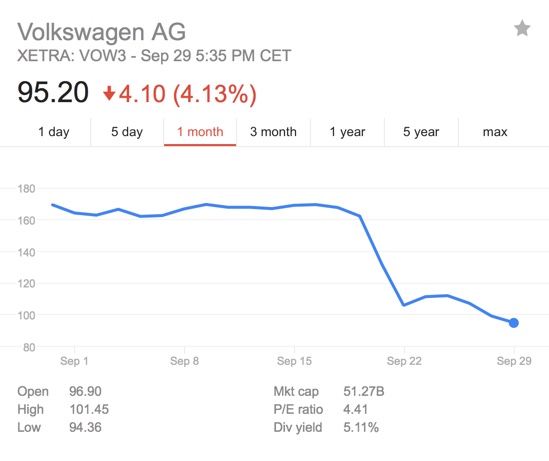Valuation of the Week #4: Volkswagen and Scandal Investing
Volkswagen has worked hard to make itself an automobile giant. Last year, the company was second only to Toyota in global market share. The company has been able to weather the 2008 crisis well, and has seen revenues and earnings climb, albeit at the moderate levels that befit a mature automobile company.
In the last few weeks, we have seen the wheels come off the Volkswagen bus. The trigger was a revelation that VW had designed the computer software on its diesel automobiles to fool the EPA, when it was testing for emissions; this BBC story explains it well. Once the story became public, the &%% hit the fan. Volkswagen admitted that it had screwed up big time, its CEO resigned, a whole host of top managers lost their jobs and Volkswagen's stock price collapsed, losing almost 50% of its value in the last month.

It is quite clear that this scandal is going to cost Volkswagen, with Volkswagen already setting aside $7.3 billion to cover the fines/penalties it will face, and the EPA's potential fines could expand to $18 billion. Not surprisingly, talk of lawsuits fill the air, with both European and American stockholders considering suing the company for damages; even if the company wins all of these suits, it will be paying hefty legal fees along the way.
There is also talk of lost trust and tarnished brand names, but these remain PR buzzwords until they start showing up in lost sales/profits. Unlike the BP or GM scandals, where lives were lost, this one is more of a business scandal (at least for the moment), though the New York Times segued into this argument (a little far fetched) that the VW emissions cheating could have cost lives.
The best place to start this analysis is to put yourself back in time, just over a month, and to value the company as it stood then. To do that valuation, you can draw on Volkwagen's financial history, which is summarized here. If you truly want to numb yourself, try reading Volkswagen's annual report, a model of opacity and data bulk. Once you have those, you can try valuing the company, as I did in, in this spreadsheet. The narrative that I would have spun for Volkswagen a month ago was that of a mature firm (growing barely, in Euro terms, as 0.8% a year), capable of earning its cost of capital and in steady state (it will maintain its current capital structure, business mix and regional exposure). Rather than try to value the company, I took the stock price of 176.25 Euros that the stock was trading at then, and solved for the operating income that the firm would need to generate to be trading at the prevailing market value, arriving at 9,096 million Euros in operating income, well below the operating income of 12,886 million Euros in the trailing 12 months and about 20% below the average operating income generated over the last five years.
I then brought in the effects of the scandal in three layers.
- Fines/Penalties (One time): In this layer, I look at the fines and penalties that Volkwagen has to pay, and it seems reasonable that the lower bound on this number would be the $7.3 billion that VW has already set aside, but the upper bound may be much higher, ranging to include the $18 billion (16.07 billion Euros) that would be the maximum fine (for the EPA) and other fines that may come from European governments that have also been deceived.
- Lawsuits: A big company in the midst of a self-inflicted scandal is a ripe target for lawsuits. Toyota, for instance, paid out as much as $1.2 billion in shareholder lawsuits from the lawsuits that came out of its Toyota Prius mishandling but the loss in shareholder value in that case was limited. In this case, it could amount to a multiple of this number and as I noted earlier, the legal costs will keep coming.
- Reputation Loss: This is the toughest numbers to estimate. Will customers stop buying Volkswagen cars as a result of this fiasco? To me, and I may be wrong on this, Volkswagen diesel cars in the US will take the most immediate hit, but that is not a big segment of VW's sales. Even if you accept the proposition that there will be more customers who will be turned off VW cars because of this scandal, the effect will fade over time, just as it has for Toyota, GM and Ford, each of whom has had a scandal (or two) in the past. In fact, the car business is full of fallen sinners, and it seems unlikely that any company will be tarred for life, just because of one scandal.
I made what I thought were conservative assumptions about each of these effects (the maximum EPA fine, an additional 10 billion Euros in fines from European governments, 4 billion Euros in legal costs and payouts and a 20% loss in operating income for the next 5 years) and revalued Volkwagen to arrive at a value of 111 Euros/share, about 10% higher than the stock price (weighted average of 100 Euros/share) at the time of this assessment. More importantly, much as this scandal is in the news, my narrative for Volkswagen has changed very little: it is still a mature, not particularly imaginative firm in a bad business that generates enough operating income to cover its cost of capital. As of this morning, Volkswagen is part of my portfolio. Let the fun begin!
Data
- Volkswagen Historical Financials (1992-2015)
- Volkswagen Annual Report - 2014
- Volkswagen Half Year Report - June 2015
Spreadsheets
- Valuation of Volkswagen (pre-scandal), to get imputed operating income
- Valuaton of Volkswagen (post-scandal)
Google Shared Spreadsheet